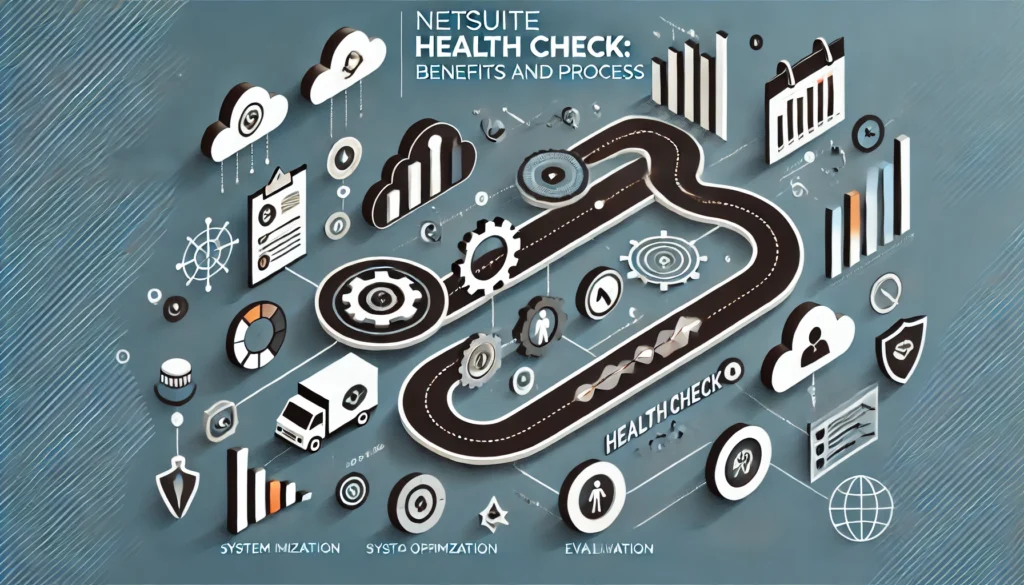NetSuite Health Check is a comprehensive process that evaluates the performance, configuration, and functionality of your NetSuite ERP system. In today’s dynamic business landscape, maximizing the efficiency of your ERP system is vital for sustaining growth and staying competitive. It identifies inefficiencies, resolves potential issues, and ensures the system aligns perfectly with your business needs. For organizations leveraging NetSuite, regular health checks can transform the way they operate, enhancing productivity and delivering long-term value.

Table of Contents
ToggleWhat Is a NetSuite Health Check?
A NetSuite Health Check involves an in-depth analysis of your NetSuite ERP system. It evaluates how well the system performs, whether it meets your business objectives, and how effectively it integrates with other tools. The process uncovers gaps in system usage, identifies areas for improvement, and ensures that your ERP operates at its optimal capacity.
Why Do You Need a NetSuite Health Check?
As businesses grow and processes evolve, ERP systems can become misaligned with current needs. Here are key reasons why a health check is indispensable:
- Optimizing System Performance: Over time, performance issues such as slow data processing or delayed report generation can arise. A health check identifies and resolves these bottlenecks, ensuring that your system remains fast and efficient.
- Adapting to Business Changes: Whether it’s new market demands, expanded product lines, or an increase in transaction volume, your NetSuite ERP must keep pace with your evolving operations. Health checks help you adapt by recommending necessary upgrades or configurations.
- Improving User Experience: Unresolved system issues can frustrate users and reduce productivity. A health check enhances the user experience by addressing pain points and making the ERP easier to use.
- Ensuring Compliance and Security: With regulatory requirements and security threats constantly changing, it’s crucial to ensure that your NetSuite ERP adheres to the latest compliance standards and safeguards sensitive data.
- Maximizing ROI: A poorly performing ERP system can drain resources without delivering results. Regular health checks ensure that your investment in NetSuite continues to provide value by aligning the system with your business objectives.
Key Components of a NetSuite Health Check
- Performance Analysis: The first step is to evaluate the system’s performance, including response times, data load efficiency, and report generation speed. This ensures that the ERP operates smoothly even during peak usage.
- Configuration Review: Assessing the system’s configurations is essential to ensure they align with your current processes. Outdated configurations can hinder efficiency and increase the risk of errors.
- Customization Assessment: NetSuite allows for extensive customization, but poorly implemented customizations can lead to inefficiencies. A health check reviews these customizations to ensure they’re beneficial and relevant.
- Data Integrity Evaluation: Accurate and consistent data is critical for decision-making. A health check identifies and rectifies data discrepancies, ensuring that the information in your system is reliable.
- Integration Analysis: NetSuite often integrates with other business tools such as CRM or e-commerce platforms. Evaluating these integrations ensures seamless workflows and prevents disruptions.
- User Feedback and Training Review: Users are the lifeblood of any ERP system. Collecting feedback and assessing training needs helps identify gaps in usability and ensures that employees can maximize the system’s capabilities.

Benefits of Regular NetSuite Health Checks
- Enhanced Productivity: By identifying inefficiencies and streamlining processes, a health check ensures that your team can complete tasks more quickly and effectively.
- Improved Decision-Making: With accurate data and optimized reporting tools, decision-makers can access the insights they need to make informed choices.
- Cost Savings: Addressing issues before they escalate reduces the risk of costly downtime or system failures.
- Future-Proofing: A health check helps your business stay ahead of technological advancements by identifying necessary updates or features that can keep you competitive.
When Should You Schedule a NetSuite Health Check?
The frequency of health checks depends on factors such as business size, industry, and system complexity. However, common scenarios where a health check is particularly beneficial include:
- Before Major Upgrades: To ensure the system is prepared for new features or functionalities.
- Post-Implementation: To verify that the system is configured correctly and delivering value.
- During Business Growth: To align the ERP with expanding operations and new challenges.
When Issues Arise: If users report recurring problems or if system performance declines
Steps to Conduct a NetSuite Health Check
- Preliminary Assessment: Begin by defining the objectives of the health check and gathering input from stakeholders to identify specific pain points.
- System Analysis: Perform a comprehensive review of system configurations, customizations, integrations, and performance metrics.
- User Feedback Collection: Survey users to understand their challenges and gather suggestions for improvement.
- Action Plan Development: Based on the findings, create a detailed action plan outlining recommended changes, priorities, and timelines.
- Implementation and Follow-Up: Implement the recommended changes and schedule follow-up checks to monitor the impact of improvements.
Why Choose Custom NetSuite Health Check Services?
While basic health checks provide valuable insights, customized services offer tailored solutions that address your unique challenges. These services include:
- Industry-Specific Assessments: Recommendations based on your industry’s specific needs and regulations.
- Scalable Solutions: Ensuring your system can grow alongside your business.
- Proactive Maintenance: Identifying potential issues before they affect your operations.
Conclusion
Regular NetSuite health checks are essential for optimizing system performance, improving user experience, and ensuring your ERP system evolves alongside your business. By proactively addressing inefficiencies and adapting to new challenges, health checks help you maximize the value of your investment in NetSuite.
At Suitepedia, we’re committed to helping businesses unlock the full potential of their NetSuite ERP systems. Our customized health check services are designed to ensure your system operates at its best, delivering long-term value and supporting your success.



